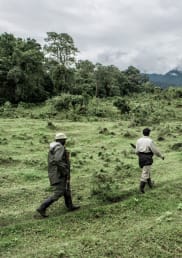Transitional justice reform in Nepal must be more inclusive
International Alert, together with over 50 civil society organisations in Nepal, is calling on the government to ensure wider consultation on any amendments to the existing truth and reconciliation legislation.
In mid-June 2018, we held consultations in Banke and Bardiya districts with civil society and victims of armed conflict, to discuss gaps in, and problems with the implementation of, the existing Enforced Disappearances Enquiry, Truth and Reconciliation Commission Act of 2014.
Victims groups shared their pain and grievances, their expectations for justice, truth and reparation, as well as their dreams for a more peaceful country. It was great to see a hope and commitment from victims – hope for justice and peace, and a commitment to rebuild Nepal.
What International Alert Nepal learned during these consultations helped to prepare a series of recommendations for new legislation on the issue.
Soon after, however, on 21 June, the government released a draft Transitional Justice Bill to amend the existing legislation. The 22-page draft proposed changes to most of the 42 clauses of the existing act and tries to address some of the concerns that victims and civil society have been expressing repeatedly, as well as the various rulings by the Supreme Court on the matter.
Civil society organisations and human rights defenders welcomed the draft legislation being made public, but criticised the limited nature of the informal consultation beforehand. As a result, the draft bill failed to address the voices of victims and ensure truth, justice, reparation and the guarantee of non-re-occurrence of violent conflict.
In a meeting with victims upon releasing the draft, the then Minister for Law, Justice and Parliamentary Affairs, Sher Bahadur Tamang, said the bill would be revised in accordance with the recommendations of victims and other stakeholders. The government also asked victim’s groups and civil society to provide comments on the bill.
In response, we prepared a preliminary observation and recommendations paper, which we shared with civil society and victims’ groups for wider consultation and feedback on 17 July – the World Day for International Justice.
More than 50 civil society organisations inputted on the paper, a loose transitional justice working group formed as part of the process. Based on the feedback, the group prepared a ‘Preliminary review and recommendations by civil society organizations on the draft bill on transitional justice’.
We now call on the government to have wider consultation with civil society and victims on the legislation, and to make the transitional justice process more inclusive and meaningful in achieving its stated objectives.




